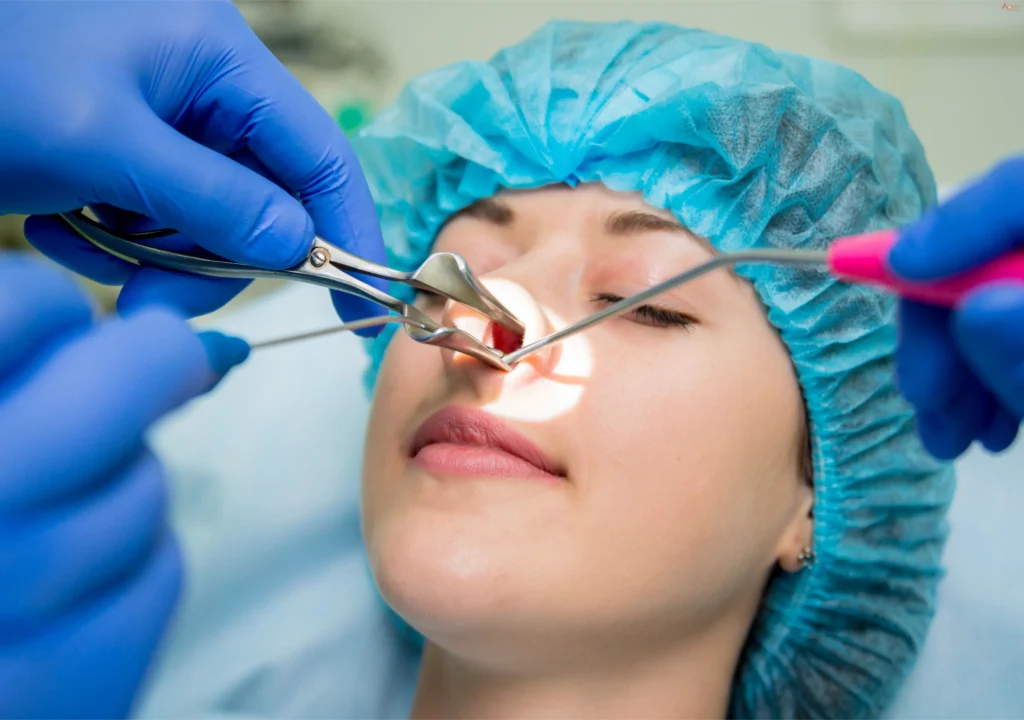Endoscopic Sinus Surgery
Endoscopic Sinus Surgery is a minimally invasive approach to treating various nasal conditions, including chronic sinusitis. This surgery uses endoscopes—thin, flexible tubes with attached cameras and lights—to provide detailed views of the nasal structures, helping the surgeon with precise and effective treatment.

What is Sinusitis?
Sinusitis is the inflammation or swelling of the tissue lining the sinuses. Healthy sinuses are filled with air, but when they become blocked and filled with fluid, they can attract bacteria, viruses, or fungi, leading to infection. Sinusitis can be acute, lasting up for a few weeks, or chronic, persisting for months despite treatment attempts.
Why Chronic Sinusitis Might Require Surgery?
Chronic sinusitis significantly affects one’s daily life, causing troubling symptoms such as nasal congestion, facial pain or pressure, loss of smell, and a continuous cough. When conventional treatments such as medications, nasal sprays, and home remedies fail to alleviate these symptoms, surgery may be required. Surgical intervention restores normal sinus drainage and function by removing blockages, and polyps, or correcting anatomical issues.
What Does Endoscopic Sinus Surgery Involve?
Endoscopic sinus surgery, commonly referred to as Functional Endoscopic Sinus Surgery (FESS), is the standard surgical approach for treating chronic sinusitis. During the surgery, the surgeon uses specialized devices to remove obstructions, polyps, and infected tissue. The sinus apertures may be enlarged to improve drainage. The procedure usually takes between one and three hours, depending on the complexity of the case.
Benefits of Endoscopic Sinus Surgery
Many patients undergoing endoscopic sinus surgery report significant relief from sinusitis symptoms, including better breathing, reduced facial pain, and an improved sense of smell.
Apart from that, endoscopic sinus surgery offers numerous advantages over traditional surgical methods.
- Because it is minimally invasive, no external incisions are made. This nullifies any chance of scarring and contrarily promotes faster healing.
- The endoscope is a tool of enhanced precision as it provides a magnified view, allowing for accurate removal of affected tissue.
- Patients have the benefit of reduced recovery time, as there is little to no postoperative pain and swelling.
- The minimally invasive nature of the procedure reduces the risk of complications like infection and bleeding.
How to Prepare for the Surgery?
Before going through the surgery, take these steps to get the best possible result and smooth recovery.
- Stop Smoking: If you smoke, quitting now can reduce your risk of developing complications and improve your long-term health. Smoking interferes with your nose’s ability to clear mucus properly, which can increase the sensation of a blocked nose. Continuing to smoke after sinus surgery raises the likelihood of needing another operation.
- Maintain a Healthy Weight: Try to achieve and maintain a healthy weight before your surgery. Being overweight increases the risk of complications during and after the procedure. A balanced diet and regular exercise can help you reach and maintain a healthy weight.
- Practice Good Hygiene: When you come into the hospital, practice good hand hygiene by washing your hands frequently with soap and water. Use hand sanitizer when necessary. Additionally, wear a face covering when asked to minimize the risk of infections.
- Manage Chronic Conditions: If you have any chronic health conditions, such as diabetes or hypertension, work with your doctor to ensure these conditions are well-controlled before your surgery to avoid complications.
- Follow Preoperative Instructions: Your surgeon will provide specific instructions to follow before the surgery. This may include guidelines on fasting (not eating or drinking for at least 8 hours before the surgery), taking or stopping certain medications.
- Mental Preparation: Preparing mentally for the surgery is equally important. Educate yourself about the procedure, recovery process, and potential outcomes. Having realistic expectations and a positive mindset can help you cope better.
AUM ENT Clinic stands out as a premier option for sinus surgery. Dr. Shailesh, with over 26 years of experience, leads a team dedicated to providing top-notch care using the latest techniques in endoscopic surgery. AUM ENT Clinic is the ideal choice for those seeking relief from chronic sinusitis and other nasal-related conditions.
